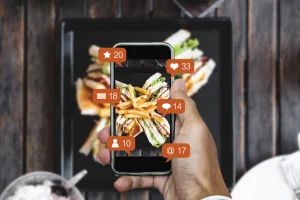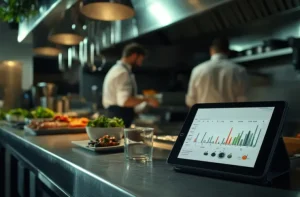In today’s competitive world, launching a catering business and restaurant, and managing a successful commercial kitchen isn’t just about serving quality food. Rather, to truly stand out in the food and gastronomy industry, you must offer a personalized and professional customer experience. Consequently, this is where using a specialized Centralized Restaurant CRM for restaurants becomes crucial.
Therefore, with a smart and integrated CRM design, restaurants can gather valuable customer behavior data, make their communications more targeted, and ultimately boost customer loyalty by providing customized services. In this article, we’ll explore the benefits of using CRM in restaurants, its key features, different types of customer management systems, and how it impacts catering design and industrial kitchen efficiency.
What is Restaurant CRM?
Restaurant CRM is a specialized tool designed to record, analyze, and optimize interactions with customers. Unlike general CRMs, however, these systems are precisely tailored to the needs of the food industry, commercial kitchens, and food court design.
Specifically, an integrated customer relationship management system for launching catering and restaurants collects data related to table reservations, orders, food preferences, customer feedback, and loyalty activities into a cohesive dashboard. As a result, this empowers managers to make more precise, customer-centric decisions.
Examples of information stored in each customer’s profile:
- Contact information
- Dietary sensitivities and food preferences
- Order history and visit frequency
- Feedback and reviews
- Loyalty program membership status and points
Key Features of Restaurant CRM
If you are designing and launching a catering business and restaurant or arranging industrial kitchen equipment, then considering CRM as a key module for customer interaction is essential. Indeed, important features of a restaurant CRM include:
- Guest Profiles: Detailed information such as birthdays, favorite dishes, and sensitivities is recorded to create a personalized experience.
- Integration with Reservation & Table Systems: Visit information is automatically recorded in the customer’s profile, thereby optimizing coordination.
- Order Tracking & Customer Behavior: Analyzing orders, average check size, and dining habits helps you in menu design and executing effective campaigns.
- Marketing Automation: This includes sending SMS or emails to inactive customers, birthday greetings, or popular dish suggestions.
- Loyalty Program Connection: Furthermore, it allows for tracking points, discounts, and exclusive rewards for loyal customers.
- Feedback Management: Ultimately, it enables receiving, analyzing, and quickly responding to reviews to maintain customer satisfaction.
- Analytical Reporting: Finally, it provides an examination of metrics such as customer lifetime value, campaign effectiveness, and return visit rates.
Why is CRM Important in Catering and Food Court Design?
In food court design or industrial kitchen equipment layout, tools that lead to performance optimization and revenue increase should be utilized. CRM is precisely one such tool. Here are some of its key advantages:
- Personalized Guest Experience: Customers who feel recognized are more likely to return. Consequently, this directly boosts customer loyalty.
- Cost-Effective Customer Retention: Retaining customers costs less than acquiring new ones. Therefore, CRM increases repeat visits by offering personalized suggestions.
- Targeted Marketing: Instead of sending generic messages, campaigns can be personalized based on customer preferences, behavior, or order history.
- Increased Sales: Moreover, by suggesting items related to previous orders or introducing complementary dishes, the average check value increases.
- Improved Staff Performance: Finally, quick access to customer information significantly enhances staff preparedness when interacting with customers.
3 Main Types of CRM
In the restaurant and gastronomy sector, three types of CRM are defined, which are usually used in combination:
- Operational CRM: This type manages day-to-day processes such as reservations, orders, and direct guest communication.
- Analytical CRM: Conversely, this focuses on analyzing customer data and behavior to optimize menus or loyalty programs.
- Collaborative CRM: Lastly, it integrates information across different restaurant departments (for example, front-of-house, kitchen, and marketing).
Best CRM Systems for Restaurants
To illustrate, here are 5 popular CRMs in the food industry:
| System | Pros | Cons |
|---|---|---|
| OpenTable | Strong brand, accurate reservation data, and automated feedback | Limited control over data |
| Eat App | Detailed behavior analysis, suitable for small to medium restaurants | Requires initial training |
| SevenRooms | Full data ownership, suitable for luxury concepts | High cost |
| Toast | Comprehensive system with loyalty and POS features | Limited marketing capabilities |
| Lightspeed | Menu and guest behavior analysis | Complex technical configuration |
Benefits of Using an Integrated CRM in Industrial Kitchen and Catering Design
- Data Centralization: All customer information is kept in a cohesive dashboard.
- Increased Loyalty: Furthermore, with special points and rewards, customers become more attached to the brand.
- Improved Campaign Efficiency: As a result, marketing becomes more precise without wasted resources.
- Better Reservation Management: Ultimately, this leads to enhanced table preparation and service for loyal guests.
- Increased Sales through Personalized Offers
- Improved Staff Performance with Accurate Data
- Rapid Feedback Response
- Real-time Customer Behavior Reporting
- Overall Revenue Increase: This includes repeat purchases, a higher average check, and a reduced churn rate.
Conclusion
In summary, if you are on the path to industrial kitchen design, equipment layout, food court design, or launching a successful food franchise, having an integrated CRM system is vital for sustainable growth. Not only does this tool enhance human interactions, but it also aids smarter decision-making through data utilization.
Parsa International Design and Construction Company, moreover, leveraging specialized knowledge in designing and executing industrial kitchen projects, can be the ideal consultant for selecting and implementing CRM systems alongside your cohesive food space design.
Therefore, for specialized consultation with the Parsa team, contact us now.




